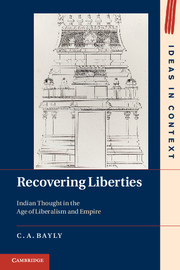Book contents
- Frontmatter
- Contents
- Preface
- Note on Indian names
- Introduction
- Chapter 1 The social and intellectual contexts of early Indian liberalism, c.1780–1840
- Chapter 2 The advent of liberalism in India
- Chapter 3 The advent of liberal thought in India and beyond
- Chapter 4 After Rammohan
- Chapter 5 Living as liberals
- Chapter 6 Thinking as liberals
- Chapter 7 Giants with feet of clay
- Chapter 8 Liberals in the Desh
- Chapter 9 ‘Communitarianism’
- Chapter 10 Inter-war
- Chapter 11 Anti-liberalism, ‘counter-liberalism’ and liberalism’s survival, 1920–1950
- Conclusion
- Glossary
- Select bibliography
- Index
- References
Chapter 11 - Anti-liberalism, ‘counter-liberalism’ and liberalism’s survival, 1920–1950
Published online by Cambridge University Press: 05 June 2012
- Frontmatter
- Contents
- Preface
- Note on Indian names
- Introduction
- Chapter 1 The social and intellectual contexts of early Indian liberalism, c.1780–1840
- Chapter 2 The advent of liberalism in India
- Chapter 3 The advent of liberal thought in India and beyond
- Chapter 4 After Rammohan
- Chapter 5 Living as liberals
- Chapter 6 Thinking as liberals
- Chapter 7 Giants with feet of clay
- Chapter 8 Liberals in the Desh
- Chapter 9 ‘Communitarianism’
- Chapter 10 Inter-war
- Chapter 11 Anti-liberalism, ‘counter-liberalism’ and liberalism’s survival, 1920–1950
- Conclusion
- Glossary
- Select bibliography
- Index
- References
Summary
The political construction of the Hindu Right was an event that occurred largely after 1947 and particularly in the 1970s. A softer Hindu populism, as advocated by leaders such as Madan Mohan Malaviya, remained more significant in the 1920s and 1930s and continued to have much in common with the older liberal tradition. The type of political philosophy associated today with Hindutva was a fringe set of ideas associated with a small number of ideologues in Bengal and, particularly, western India. Nevertheless, V. D. Savarkar’s writings, notably Hindutva: who is a Hindu?, have considerable comparative relevance for this study, if only because they articulated a sweeping critique of liberal ideology and had begun to influence the ideology of militant bodies such as the Rashtriya Swayamsevak Sangh. Similarly, themes common to the whole spectrum of Indian political thought emerge if we bring into the equation another figure, India’s most influential Marxist ideologue, M. N. Roy, as does the following section.
Ambedkar, Savarkar and Roy, let alone Iqbal and the Aga Khan, would have been outraged by any attempt to put them within the same range of discourse and probably by any argument that classed them with the earlier liberals. There is no attempt here to suggest that they fit into intellectual traditions that are basically contiguous or continuous. What appears to be true, however, is that these writers, who were leaders of a second rank of public intellectuals, less renowned than Gandhi, Nehru or Tagore, continued to transact within a single, broad intellectual economy. Rigid classifications into Right and Left are somewhat anachronistic for this period, as indeed they were in contemporary Europe, where fascism could emerge out of strains of both socialism and elite conservatism, while a self-proclaimed liberal such as the Italian Pietro Gobetti had much in common with his fascist opponents. In India this fluid intellectual economy comprised a range of themes derived from classical Indian traditions, paired with, and modified by, nineteenth-century liberal ideas. These ideas were now further transformed by the impact of transnational welfarism, Gandhianism, Marxism and, more distantly, fascism itself.
- Type
- Chapter
- Information
- Recovering LibertiesIndian Thought in the Age of Liberalism and Empire, pp. 311 - 342Publisher: Cambridge University PressPrint publication year: 2011



